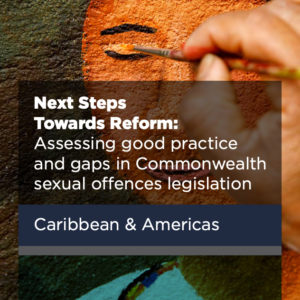Barbados’ sexual offences laws are in its Sexual Offences Act 1992 [Chapter 154] (SOA). Although that law contains some provisions that meet the good practice standards, overall the legislation is outdated and does not reflect good practice or meet international human rights standards.
Provisions of the SOA that meet good practice standards include a comprehensive definition of penetrative sexual offences. In addition, the SOA includes a comprehensive definition of sexual assault covering penetration of all orifices by any body part or object. Other aspects of the law do not accord with good practice and require reform.
While introducing marital rape into the law as a crime by the Sexual Offences (Amendment) Act 2016 was a significant and positive reform, the amendments did not go far enough to meet good practice standards – marital rape is a crime only if it can be proven that it was accompanied by force or fear. Marital rape should be criminalised in every circumstance without exception and should carry the same penalty as non-spousal rape.
Other areas in which Barbados’ sexual offences law falls short of good practice include using derogatory terms such as ‘imbecile’ and ‘idiot’ in relation to persons with disability, as well as ‘indecent assault’, ‘buggery’ and ‘unnatural acts’. In 2022 the High Court in Barbados repealed the provisions that criminalised same-sex activity to the extent that they applied to consensual activities between persons of the same sex of 16 years or more in private. All non-consensual sexual acts, including anal ‘rape’, should be included in the standard sexual assaults provisions, such as ‘rape’ and ‘sexual assault’, as well as in child sexual offences. All of these crimes should be gender-neutral.
Although there are gender-neutral child sexual assault offences, which is good practice, they are weakened by a lack of close-in-age provisions which would allow consensual sexual activity between young people of similar age.
Barbados is a state party to relevant international and regional human rights treaties, including the Inter-American Convention on the Prevention, Punishment, and Eradication of Violence against Women (Convention of Belém do Pará), UN Convention on the Elimination of All Forms of Discrimination against Women, Convention on the Rights of the Child, Convention on the Rights of Persons with Disabilities and International Covenant on Civil and Political Rights.
The full assessment of Barbados is available here.



